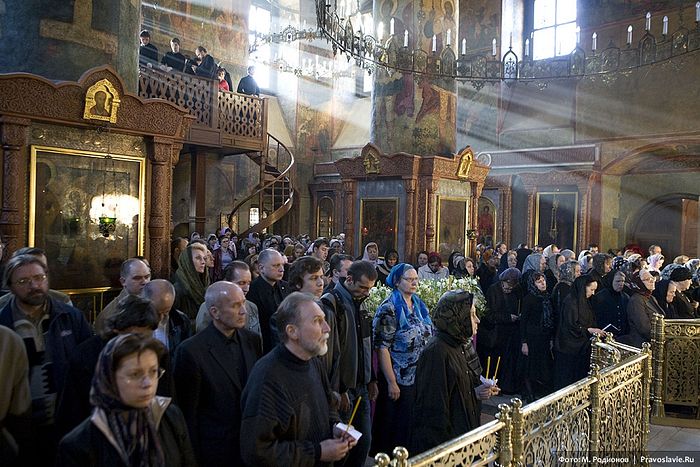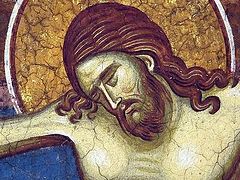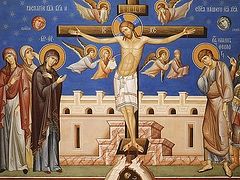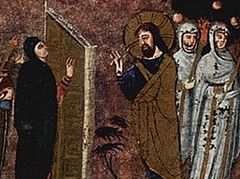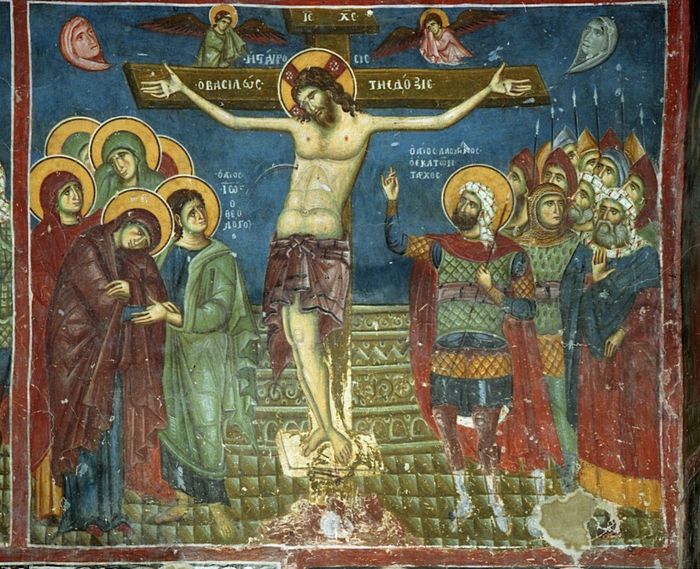 Holy and Great Friday. The Crucifixion. Fresco in the Church of St. Nicholas in Prilepe, Macadonia. 11th-13th c.
Holy and Great Friday. The Crucifixion. Fresco in the Church of St. Nicholas in Prilepe, Macadonia. 11th-13th c. Holy Week (also Passion Week) is the last week before Pascha and is devoted to the commemoration of the Savior’s final days on earth, His suffering (Passion), crucifixion, death on the cross and burial.
The Church observes it with reverence. “Of all days, the days of the Holy and Great Forty-Day Fast (Quadragesima) are the most distinguished, but even more than the Holy Forty Days is Holy and Great Passion Week exalted, and more than the days of Holy Week, Great and Holy Saturday is the most exalted. This week is called “Great” not because these days or hours are more exalted but because the great, portentous and extraordinary deeds of our Savior were accomplished during this week,1” the Orthodox Synaxarion reads.
According to St. John Chrysostom, the first Christians, ardently desiring to be with the Lord in the final days of His life on earth, would pray and fast more intensively throughout Holy Week. Imitating the Lord, Who endured unparalleled suffering out of His love for fallen humanity, they tried to be kind and lenient towards their brothers and sisters, to perform acts of charity, deeming it improper to judge others on the days of our redemption by the Blood of the Innocent Lamb. They would halt litigations, disputes, arguments, suspend punishments and temporarily release criminals (who were not sentenced for felonies) for the time of Holy Week.
Each day of Holy Week is great and holy, and each is marked by special services at churches.
Holy Week services are particularly sublime and solemn, wisely adorned with readings from the Gospels, Apostolic Epistles and the prophets, and deeply spiritual; there are inspired hymns, and a number of significant rites performed with reverence.
All that was only partly revealed and predicted in the Old Testament and fully revealed in the New Testament about the final days and hours of God Incarnate the Holy Church unites into one sublime image, which gradually reveals itself to us in the services of Holy Week.
Commemorating in its services the events of the final days of Christ’s life on earth, the Holy Church with its attentive eye of love and veneration observes each step and listens to every word of Christ the Savior, Who is voluntarily giving Himself up to suffering, leads us in the footsteps of the Savior through His way of the cross, from Bethany to Golgotha, from His glorious Entry into Jerusalem to the last moment of His atoning Passion on the Cross for our sins, and up to the triumph of His radiant Resurrection.
The aim and message of the services of Holy Week are to bring us closer to Christ by reading and chanting, to make us capable of seeing the mystery of redemption (that we are preparing to commemorate) with our spiritual eyes.
The first three days of this week are devoted to intensive preparation for the Passion of Christ.
Since Jesus Christ spent all the days preceding His Passion in the Temple teaching people, the Holy Church marks these days by services that are much longer than usual.
Trying to focus and concentrate the attention and thoughts of the faithful on the incarnation of the Lord and His ministry to mankind as they were narrated in the Gospels, the Holy Church in the first three days of Holy Week reads the entire four Gospels at the Hours.
The teachings of Jesus Christ, made after the Entry to Jerusalem and addressed to His disciples, scribes and Pharisees, evolve and are revealed in all the hymns of the first three days of Holy Week.
Since numerous significant events that are closely connected with the Passion of Christ happened in the first three days of Holy Week, the Holy Church reverently commemorates them on the same days.
Thus the Holy Church on these days leads us in the footsteps of the Divine Teacher (together with His disciples)—to the Temple, to people, to publicans, to Pharisees, and instructs us with the very words with which Christ addressed His listeners.
Preparing the faithful for the Savior’s Passion, the Holy Church fills the services of the first three days of Holy Week with an atmosphere of sorrow and contrition for our sinful nature.
On Wednesday evening the liturgical period of Lent ends, the bitter laments of the sinful human soul fade away in the church hymns, and the days of another lamentation that runs through the services begin: the cry of the recollection of the terrible torments and Passion of the Son of God on the cross.
At the same time, other feelings—the unspeakable joy of our salvation, infinite gratitude to our Divine Redeemer—fill the souls of believers.
Mourning for the Lord Who is suffering innocently, is mocked, scourged, and crucified, shedding bitter tears under our Savior’s cross, we also feel an inexpressible joy realizing that the Lord, Who was crucified on the cross, will not only rise Himself, but also raise us from the dead.
Attending church services of Holy Week and remembering the events of Christ’s final days of life on earth as if they were happening before our eyes, we walk through the sublime, moving and infinitely edifying story of the Passion of Christ, “walking with Him and being crucified with Him” in our minds and hearts.
Through this week the Holy Church calls on us to put aside all worldly and secular things and to follow after our Savior.
The Church Fathers arranged the Holy Week services so that they could reflect all the pain and suffering of Christ.
On these days a church alternately represents the Upper Room, and the Garden of Gethsemane, and Golgotha.
The Holy Church adorns the services of Holy Week with a particular outward grandeur, with deeply spiritual and inspired chants, and a number of very significant rites that are only served during this week.
Therefore, those who are present at all church services on these days truly follow the Lord on His journey to the cross in a visible way.
Monday, Tuesday and Wednesday of Holy Week are devoted to the commemoration of the Savior’s last conversations with His disciples and people. On each of these three days the Gospel is read at all services, and thus all the four Gospels are read entirely.
And those who have the opportunity are expected to read these Gospels at home for their own benefit and for those around them. This instruction can be found in the Church calendar.
If you listen to these Gospels in church, many things may escape your attention on account of the large amount of reading, but reading at home allows you to follow Christ in your minds and hearts.
If we read the Gospels attentively, the Passion of Christ will be revived in our memories and fill our hearts with a strong tender feeling… That is why, while reading the Gospel we cannot help but mentally participate in all these events, walking after the Savior and suffering with Him in our minds.
We are also expected to contemplate Christ’s Passion with reverence. Without this contemplation, neither our presence at church, nor our hearing or reading the Gospels will be of any effect.
But what does the meditation on Christ’s Passion mean and how should we do it?
First of all, imagine the Savior’s Passion as vividly as possible—at least the key moments: how He was betrayed, tried and condemned; how He carried the cross and was lifted up on the cross; how He cried out to the Father in the Garden of Gethsemane and Golgotha and gave up His spirit to His father; how He was taken down from the cross and buried… Then ask yourselves for what purpose He Who was absolutely innocent, Who as the Son of God could have remained in everlasting glory and bliss, endured such great torments and agony. And what was the cause of this?
Additionally, ask yourselves: What I am supposed to do, that the Savior’s death might not remain fruitless for me; what I should do to really partake in the salvation of the world achieved on Golgotha.
The Church teaches us that for this we need to absorb the teaching of Christ with both our minds and hearts, to keep His commandments, to repent and imitate Christ by living good lives.
And your conscience will tell you whether you do what you are expected to do or not…
An analysis of this kind (which is possible for everyone) will bring the sinner closer to the Savior amazingly soon, closely unite him with the cross forever by a union of love, and vigorously and powerfully make him a participator in the events on Golgotha.
The path of Holy Week is that of fasting, repentance and Communion; to be more exact, a period of preparation for this sacrament in these great and holy days.
And how can we do otherwise, when the Bridegroom shall be taken from us (Mt. 9:15), when He is hungry at the barren fig tree and thirsty on the cross? Where else but under the cross can we lay down the burden of our sins through confession? When else should we drink from the Cup of Life but now, in these days, when it is being offered us by the Hands of the Lord Himself?
Indeed, he who voluntarily avoids partaking of the Body and Blood of Christ on these days avoids the Lord Himself, and flees from his own Savior.
The path of Holy Week is to aid the needy, the sick and the suffering in His Name. This path may seem distant and indirect, yet in reality it is very close, convenient and direct.
Our Savior is so loving that all we do for the poor, the afflicted, the homeless and the suffering in His Name He accepts as if it were done for Him. At the Last Judgment He will first and foremost ask us about our acts of mercy towards our neighbors, and our salvation or condemnation will largely depend on it. Bearing this in mind, never pass up any opportunity to relieve the suffering of “the least of His brethren” (cf. Mt. 25:40), not least on the days of Holy Week. For example, if you clothe a person in need you will imitate St. Joseph of Arimathea who purchased a shroud to wrap Jesus’ body.
These are the main deeds (possible for everyone) with which an Orthodox Christian can follow the Lord before His Passion in Holy Week.

